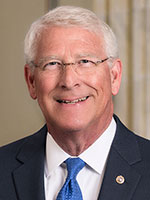Ranking Member, Senate Committee on Commerce, Science and Transportation
Perspective: Opportunities to Help Ocean Freight
[Stay on top of transportation news: Get TTNews in your inbox.]
Supply chain disruptions have impacted the quality of life for virtually every American. The delays and bottlenecks, which began early in the pandemic, continue sending shockwaves throughout our economy, leading to higher prices and back orders with no end in sight.
This congestion stemmed from the unprecedented surge in consumer demand during the pandemic. Moving such vast amounts of freight around the world is extremely complex and requires optimization across multiple parts of the supply chain. We have all seen images of ships lined up for miles waiting to unload cargo, but the challenges extend inland as well.
Port terminal and warehouse space remains limited. A shortage of intermodal equipment, such as truck chassis, has left containers sitting longer at terminals and rail yards. Workforce disruptions have caused slowdowns across the transportation sector. With so much freight to move, each link in the supply chain has not been able to operate at maximum efficiency.

Wicker
Unfortunately, White House policies have done little to help. A massive stimulus bill in 2021 and hostility toward domestic energy production have added pressure to an already strained supply chain. And the president’s call for 24/7 operations at West Coast ports has not panned out — the number of ships waiting to unload remains above pre-pandemic levels. Meaningful steps are needed to address these challenges.
Long-term, we need to invest in roads, bridges, ports and railroads, steps I supported in the bipartisan infrastructure law. If implemented as written — without additional requirements that could deter good projects — this law will support American commerce for years to come.
There also are near-term steps that could reduce stress on our supply chain. As the lead Republican on the Commerce Committee, I have been pushing several of these initiatives.
On June 16, President Biden signed the Ocean Shipping Reform Act, which will provide the Federal Maritime Commission with tools to help address long-standing concerns about unreasonable fees and a lack of transparency in ocean shipping. Among the more notable provisions, the bill will establish a streamlined process for FMC to receive complaints about unreasonable charges. It will also set standards for surcharge invoices assessed against shippers or motor carriers, provide an easy way to challenge unfair surcharges, and offer greater protection for shippers and truckers who seek redress at the FMC from retaliation by ocean carriers.
OSRA also includes provisions I championed last year in my proposed FREIGHT Act. These provisions will help streamline the licensing process to credential truck drivers, formally authorize FMC’s dispute resolution service, and develop best practices for chassis management. American importers and exporters expect fair and transparent rules, and this bill will take important steps to address their concerns.
Still, there is more we can do. America’s ports still rank low in performance by global standards, moving goods more slowly to consumers. Republican proposals to modernize our ports have called for adoption of automated port terminals and equipment that could speed up container movement and improve how we organize and stage freight. Other proposals include programs that could help ports integrate data-driven technologies that better inform shippers of the location of their freight, and when they can pick up and drop off containers. Federal grant programs that invest in port facilities could support these upgrades.
I am glad we advanced OSRA with the FREIGHT Act provisions with large bipartisan support, but it is regrettable that Congress has not yet advanced technologies that further improve our ports.
The challenges facing freight transportation are complex and global in scale, and the private sector will play a lead role in supply chain modernization. But Congress should continue to support this work by making smart investments, lifting regulatory barriers, and enabling innovation at our ports to flourish.
Roger F. Wicker has represented Mississippi in the United States Senate since December 2007. Wicker serves as the ranking member of the Senate Committee on Commerce, Science and Transportation for the 116th Congress.
Want more news? Listen to today's daily briefing below or go here for more info:

